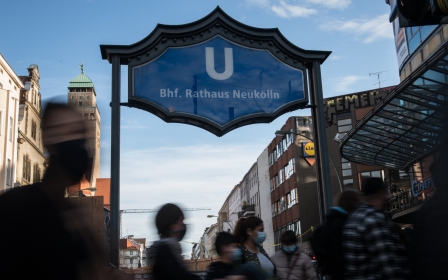Germany: New citizenship test to include questions on Holocaust and Israel's founding

Questions around Jewish life in Germany, the Holocaust and Berlin's relationship with Israel will soon form part of Germany's naturalisation test, the country's Interior Minister Nancy Faeser said on Tuesday.
"Antisemitism, racism and other forms of contempt for humankind preclude naturalisation. There is no tolerance whatsoever," Faeser told the German magazine Der Spiegel.
"Anyone who does not share our values cannot obtain a German passport."
Germany's citizenship test currently comprises 33 questions, and requires at least 17 correct answers for an applicant to pass.
Nine new questions will be added to the revised test, including asking the participant what a Jewish prayer house is called, when Israel was founded and who is allowed to become a member of the German-Jewish sports club Makkabi.
New MEE newsletter: Jerusalem Dispatch
Sign up to get the latest insights and analysis on Israel-Palestine, alongside Turkey Unpacked and other MEE newsletters
The candidate is also required to know how Holocaust denial is punished in Germany and to list the reasons behind the country's "special relationship" with Israel.
"Anyone who wishes to obtain German citizenship must know what that means and acknowledge Germany’s responsibility. This commitment must be 'clear and credible'," Faeser said, adding that the ministry is looking to change the regulation soon.
The additional citizenship questions are part of a larger overhaul of the country's immigration law. In January, the Bundestag, the German parliament, passed a law to facilitate naturalisation by lowering the number of years that a person must have lived in Germany in order to obtain a passport, from eight to five years.
Immigration law overhaul
In December last year, the German state of Saxony-Anhalt mandated citizenship applicants to recognise Israel's right to exist in a written statement.
The ruling was followed by discussions in parliament on whether this law should be extended to a federal level.
The German government, however, refrained from requiring a written statement recognising Israel's right to exist as part of the revised citizenship test, Der Spiegel reported.
The revised questions come at a time of increased crackdown on Palestinian and pro-Palestine voices in Germany following the Hamas-led attack in Israel on 7 October last year and amid Israel's ongoing assault on the Gaza Strip.
The government says it has a special responsibility to tackle increased antisemitism and anti-Israel sentiment in the country.
But rights and cultural groups are objecting to what they say is a disproportionate focus on Arab and Muslim citizens and the conflation of pro-Palestine activism with antisemitism.
In recent months, speeches by Palestinian academics and writers have been cancelled, protests banned and strict policies regarding speech at protests and events have been implemented.
Middle East Eye delivers independent and unrivalled coverage and analysis of the Middle East, North Africa and beyond. To learn more about republishing this content and the associated fees, please fill out this form. More about MEE can be found here.





